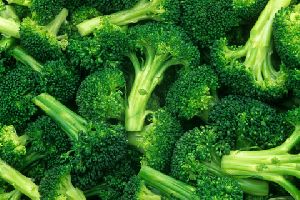
Broccoli
Get Price Quote
This cool-season crop grows best when daytime temperatures are in the 60s F. Grow in both spring and fall, but avoid mid-summer crops as hot weather can cause premature bolting.Like spinach, can be grown in the spring or fall. In fact, you may be able to get a continual harvest throughout both seasons if you time planting correctly. A member of the cabbage family, broccoli is rich in vitamins.Lifecycle: annual, Biennial grown as an annual.Ease-of-care: moderately difficultRequires good soil, timely planting and protection from pests.Height: 2 to 3 feetSpread: 2 to 3 feetBloom time: early summer, mid-summer, late summer, early fall, mid-fallFlower color: yellowFoliage color: medium green, Some cultivars have a bluish cast.Foliage texture: mediumShape: uprightGrowing InformationBroccoli prefers full sun, but partial shade can prevent plants from bolting (going to seed) in areas with warm spells. Provide a rich, well-drained soil, with plenty of compost. Cool days and nights are essential once the flower heads start to form. Theres a wide range of days to maturity, so pick a cultivar that will mature before the weather in your area turns hot. Gardeners in most temperate areas can harvest both spring and fall crops. In areas without ground freezes, try growing a third crop by planting a slow-maturing variety such as Marathon in winter.Sunlight: full sun, Can tolerate light shade but will slow maturity.Soil conditions: requires well-drained soil, Prefers well-drained, fertile soil high in organic matter, pH 6.0 to 7.5. Can tolerate slightly alkaline soil. Needs plentiful, consistent moisture.PlantingBroccoli is hardy; it can germinate at temps as low as 40ºF.Broccoli requires full sun and moist, fertile soil thats slightly acidic.If you live in a warm climate, a fall planting is best, as broccoli thrives in cool weather. Plant seeds in mid- to late-summer in most places.For spring plantings, direct sow outdoors (or transplant seedlings) 2 to 3 weeks before last spring frost date.For fall plantings, direct sow seeds outdoors 85 to 100 days before your average first fall frost.If you transplant, assume 10 less days for growth or the "days to maturity" on the seed packet.Work in 2 to 4 inches of rich compost or a thin layer of manure before planting.Space plants 12 to 24 inches apart, depending on the side heads you want to harvest.Plant seeds 1 inch deep, 3 inches apart. You will need to thin seedlings.CareFertilize three weeks after transplanting.Provide consistent soil moisture with regular watering, especially in drought conditions. Some varieties of broccoli are heat tolerant, but all need moisture.Do not get developing heads wet when watering.Roots are very shallow, do not cultivate. Suffocate weeds with mulch.Mulch will also help to keep soil temperatures down.HarvestIn terms of timing: Harvest broccoli when the buds of the head are firm and tight before the heads flower. If you do see yellow petals, harvest immediately.For best taste, harvest in the morning before the soil heats up.Cut heads from the plant. taking at least 6 inches of stem.Cut the stalk of the main head at a slant, about 5 to 8 inches below the head.Most varieties have side-shoots that will continue to develop after the main head is harvested. You can harvest from one plant for many weeks, in some cases, from spring to fall, if you are summer is not too hot.Store broccoli in the refrigerator for up to 5 days. If you wash before storing, make sure to dry it thoroughly.Broccoli can be blanched and frozen for up to one year.Special NotesBroccoli is rich in vitamins, One ounce of broccoli has an equal amount of calcium as one ounce of milk.Health BenefitsCancer Prevention - Broccoli contains glucoraphanin, which the body processes into the anti-cancer compound sulforaphane. It also contains indole-3-carbinol, a powerful antioxidant compound and anti-carcinogen found to not only hinder the growth of breast, cervical and prostate cancer, but also boosts liver function.Broccoli shares these cancer fighting, immune boosting properties with other cruciferous vegetables such as cauliflower, Brussels sprouts and cabbage.Cholesterol Reduction- Like many whole foods, broccoli is packed with soluble fiber that draws cholesterol out of your body.Reducing Allergy Reaction and Inflammation.Powerful Antioxidant - Of all the cruciferous vegetables, broccoli stands out as the most concentrated source of vitamin C, plus the flavonoids necessary for vitamin C to recycle effectively. Also concentrated in broccoli are the carotenoids lutein, zeaxanthin and beta-carotene, other powerful antioxidants.Bone Health - Broccoli contains high levels of both calcium and vitamin K, both of which are important for bone health and prevention of osteoporosis.Heart Health - The anti-inflammatory properties of sulforaphane, one of the isothiocya

Fresh Broccoli
Get Price Quote
We are offering fresh broccoli broccoli's noteworthy nutrients include vitamin c, vitamin a (mostly as beta-carotene), folic acid, calcium, and fiber. While the calcium content of one serving doesn't equal that of a glass of milk, broccoli is an important calcium source for those who don't consume dairy products. Calcium does more than build strong bones. Research shows that this mineral may play a role in the control of high blood pressure, and it may work to prevent colon cancer.
Best Deals from Broccoli